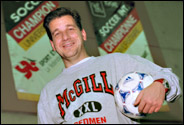kaleidoscope
Pat Raimondo: Focused on fancy footwork
 PHOTO: Owen Egan
PHOTO: Owen Egan |
|
When Pat Raimondo took over coaching duties for the McGill Redmen soccer team, many players eyed him warily. Raimondo was only 25 and there were players on the team older than he was.
"You could see some players were thinking, 'This guy is only a little older than us. How much more can he know about soccer than we do?'" Raimondo recalls. Thankfully, some of the team's more senior players urged their teammates to give the new guy a chance.
It was a wise move. Under Raimondo's leadership, the Redmen have won four conference championships and a national title in the seven years he has coached the team. The Redmen have also qualified for the national championship tournament for six years in a row.
Raimondo was recently named the Canadian Interuniversity Athletic Union's coach of the year for mens' teams. He also earned — for the fourth time, no less — coach of the year honours from the Quebec University Soccer League.
Vladimir Pavlicik, coach of Concordia University's soccer team, believes Raimondo richly deserves the honours. "He brings out the best in his players.
"In this sport," adds Pavlicik, "one of the biggest measures of your worth is the ability to make it to the national finals. Pat has led McGill to the nationals on numerous occasions."
Raimondo is quick to redirect some of the plaudits that come his way. "My coaching staff and my players make me look better than I actually am."
Raimondo had coached in elite teen leagues before arriving at McGill. He likes the combination of intelligence and dedication that he sees in the university students he now coaches.
"Maybe because of this environment, the players here really want to learn." While they're receptive to his teachings, they aren't placid about it. "They definitely want to know why I'm doing what I do. I can't feed them bullshit."
And Raimondo gives his players plenty of reasons to raise questions about his methods. He has a reputation as an unconventional coach.
In one game where the Redmen were trailing by two goals, Raimondo pulled his keeper and left his net unguarded. The plan was to add an attacker in a bid to even the score. It is the sort of thing soccer coaches never do. McGill did narrow the lead to a goal before the opposing team fired three empty net goals to win.
"There is always a method to my madness," Raimondo insists. "If you lose a game 2-1, it's more respectable than losing 6-1. But to me, it's the same thing — you lost.
"I would rather lose by a larger score knowing we did everything we could to win. If you don't risk anything, you don't win anything."
In 1997, the Redmen made it to the national championships against a heavily favoured University of British Columbia team. Few gave McGill a shot at winning, especially when one of the team's best players was red-carded out of the line-up early in the match.
UBC was a powerhouse, but Raimondo knew he had a talented keeper in Jason Forsyth and he believed his team could prevail over UBC in a penalty-kick shoot out. So McGill abandoned any notion of scoring, focusing all its energies on preventing UBC from getting a goal. In addition, Raimondo kept making player substitutions — more than 30 — to keep UBC off balance. The game ended at 0-0 and McGill went on to win the shootout and the national title.
Raimondo recently worked with the Montreal Impact pro soccer club. "I would say that the Redmen work just as hard if not harder [than the pros]," he says. "My boys work hard on the field and they work hard at their studies. They're no dummies." Indeed, 41 of his players have been named Academic All-Canadians over the years.
Asked about the hardest part of his job, Raimondo frowns. "Dealing with management." McGill offers little support, he says. When his squad gained entry to the national championships, the University was only willing to pay the way for 16 players. Every other university in the tournament supported an 18-man roster. "Soccer isn't a priority at McGill."
He takes that as an affront because, in his view, "soccer is the most beautiful sport in the world." On one level, it's deceptively easy. All you need is a ball. But in terms of probing opposing teams for weaknesses, "it's like a chess match," Raimondo posits.
It's also a sport that calls for endurance and terrific physical conditioning. Soccer players are always on the move. "You'll never see a David Wells in this sport," Raimondo says, referring to the Toronto Blue Jays' portly pitcher.
 |
||||
|
We can have the best technologies for treating drinking water, but if we haven't worked out who's going to implement it, who's going to manage it, who's going to oversee it, who's going to maintain the standards, who's going to finance it, then what's the use of having the technology? |
||||
Dangerous liaisons?
 ILLUSTRATION: Tzigane
ILLUSTRATION: Tzigane |
|
It has long been a truism among elite male athletes that if you want to score during the big game, don't score the night before. On the eve of a major competition, coaches want their players spending time with a good book, and not with the cute stewardess they met on the flight over.
Dr Ian Shrier, who teaches in the Departments of Family Medicine and Physiology, has been a sports physician at events such as the World Summer University Games. He has seen for himself how coaches frown upon sex the night before a competition.
In a recent editorial in The Clinical Journal of Sports Medicine he co-authored with student Samantha McGlone, Shrier concludes there is no compelling evidence for avoiding sex the night before a game. The two reviewed the medical studies related to the question and saw no reason to counsel athletes to take cold showers.
The piece evolved from an assignment McGlone prepared for "Body Matters," a sports medicine course Shrier teaches for students with little background in science.
"I tell students to take a statement they spot in the press and find out if it's true. She chose this and did a great job." So good, Shrier helped McGlone revise it and get it published.
"The theory among many coaches is that if you have sex the night before a game, you won't be as aggressive or competitive," says Shrier. But the few studies that have examined the question haven't turned up any indications that a night of nookie robs athletes of their strength, endurance, reaction time or other crucial abilities.
Does Shrier think coaches might relent in the wake of his editorial? "No. The coaches that don't think sex has any effect will continue to think that and the coaches who believe that sex does affect performance will go on believing that."
Whose team would you rather play on?
 |
||||
|
The pitfall that threatens male caregivers is that they want to do everything alone. Seeking or asking for assistance may be interpreted as a sign of weakness, a lack of virility, an admission of incompetence or inability. |
||||
The politics of Star Trek
 |
|
In a recent publication, Rex Brynen, respected authority on Middle East politics, tackles decidedly different terrain — the portrayal of political subjects in TV science fiction.
A sci-fi fan himself, Brynen contributed a chapter on the subject to the recent book It's Showtime! Media, Politics and Popular Culture.
Science fiction offers its creators a range of allegorical tools for commenting on political or social themes; thinly veiled counterparts to world events can occur on other planets or in the future.
Brynen, a political science professor, reports that from the 1960s to the late 1980s, most TV science fiction tended to be boosterish about mainstream American values. "Indeed, 'foreign' accents were almost always used to denote a certain alien quality, especially of the threatening variety."
More recent TV science fiction has been more nuanced and challenging, especially on the subject of bridging cultural differences, writes Brynen.
Babylon 5 used carefully planned plot twists to challenge viewers' perceptions about alien races. The dangers of stereotyping were effectively highlighted.
Brynen is critical of how the original Star Trek sometimes dealt with culture. "Treatments of indigenous cultures generally cleaved to one of two entrenched stereotypes: the dangerous barbarian, or the noble savage."
He also chides Star Trek, particularly in its earlier incarnations, for often not being very imaginative on the subject of gender equality. But, on the whole, he credits the various Star Trek programs with using interactions among different alien characters to ask thoughtful questions about tolerance and cultural clashes.
If Star Trek represented a largely optimistic view of the future, Brynen thinks it's apt that the most influential science fiction show today, The X-Files, offers dark accounts of government conspiracies.
"The 'strange new worlds' motto of Star Trek spoke ... of 1960s idealism. Fox Mulder's 'trust no one,' by contrast, may be a watchword for a more jaded and suspicious political world."

